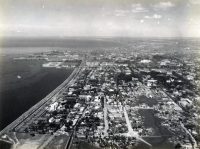Wottaday, wottaday, last night we fought fire all night. Janson spent the night on the roof of the servants’ quarters nearest the wall by the barrio, pouring water on the flying sparks. A bucket brigade from the well kept his wife and me plenty busy. We’d pass the pails up to him, and rush back for more. We were so tired and got so dirty, we were sort of mad at him, standing up there all clean and nice, while we rushed the water up to him. The fact that he was being shot at about every five minutes didn’t seem to calm our resentment.
Providence switched the wind, and I really mean that, for the wind turned at the exact moment when it seemed as though the roof was doomed. The Park Avenue houses are all burning, but most of them can be saved. Fire is really a horrible thing. I don’t blame the gods for chaining Prometheus for fooling with it.
This morning was dreadful. We were all exhausted. It took ages to feed the children. Guns and shells were
howling all around us. It all seemed hopeless. Suddenly I heard Filipinos running, shouting, chattering in the street. My first idea was that the looters were getting an unusually early start. Then I heard Miss Levin’s voice at our gate crying:
“The Americans are here, just in the next street, Ignacio!”
For three years we had waited for those words.
Dorothy Janson and I took off at full speed, tearing down Park Avenue. Suddenly, she pulled up short and with a heartbroken cry said: “It’s the Japs back again,” and started to run, back toward home.
An odd-looking small man, clad in a uniform we had never seen, and with a deep yellow complexion, yelled at us:
‘Hey you, are youse Americans?”
We turned, looked, and listened: “Dorothy,” I said, “it isn’t Japs. It’s Brooklyn!”
We had never seen a paratrooper’s uniform, nor did we know what Atabrine was, nor what it did to complexions! The lad was as yellow as any Japanese we had ever seen.
He was one of twelve, the advance patrol of paratroopers who had jumped at Tagatay on the 6th. They were tired and dirty but very pleased indeed to be in Manila. The Filipinos were crowding about them, filling their arms with fruit and hailing them as saviors—which they surely were. The boys were all delighted to see white women, speaking English, for they had heard that all Pasay was wiped out and all white people murdered. There was a terrific flurry of ‘““Where are you from’s,”’ and “Do you know so-and-so’s,” and the air was full of
English.
They had orders to patrol our section. The Japanese seemed to have all disappeared during the night—we had heard them running all night long. The paratroopers were supposed to link up with the Army from across the Pasig, at the intersecting street of Libertad, which was not far away.
I escorted a group of them to the smoking ruins of the school nearby which had been the prison of so many of
our men. We did not know where they had gone but I knew they had left many messages buried in the grounds, and I was in hopes these could be found. It was a sad sight for them, as well as for us. They found many dead bodies in their digging and some few messages.
Later in the morning a group of some twenty paratroopers moved into a compound back of us where Japanese troops had been quartered. There was a good solid wall and some foxholes there. Our whole family turned out to welcome them—dog, cat, servants, children, all of us. We had coffee on, and the inevitable pot of red beans. The situation was reversed; they were hungrier than we were. They had been on K-Rations since the day they dropped. We dished out coffee and beans and they opened up their K-Rations, which looked wonderful to us—real crackers and cheese!! I opened up the bottle of Scotch I had been saving for that great occasion. And at long last, the children got chocolate and gum—although the gum disappointed them at first. It didn’t stay sweet long enough. Sander wanted “more sugar on it.” The dog turned into a gum fiend. She chews like a real veteran. The party really waxed merry, too merry, for the Jap snipers left behind turned a machine gun our way and frightened us mightily. The sergeant yelled, “Hit the dust!’’ But we didn’t know military orders. I know I stood there like a fool, before I finally fell flat, still clutching a piece of cracker and cheese.
Their equipment is wonderful. And the radio gadgets! I’d never even heard of a walkie-talkie! I kept saying, “What did you say?” to a lad who was trying to talk over one to his officers, in still another part of Pasay. We’ll have a lot to learn.
We told them the little we knew, and got some information from them as to how badly the battle had gone for a time for them. The pillbox formations we had heard about outside Paranaque had not been reported to them by intelligence from within and they had walked right into them and lost a great number of their men. They had been badly landed, too, and the boys jumping were scattered sometimes forty miles apart—the wind on top of Tagatay Ridge had fooled the pilots, evidently. More paratroopers had come up from Nasagubu on trucks, and the fighting down that way was evidently rugged.
